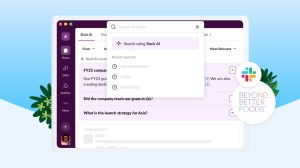By 2020, the Salesforce partner ecosystem will gain $4.14 for every dollar Salesforce makes, according to study
Salesforce customers have installed apps from the Salesforce AppExchange — the world’s longest-running and largest business apps marketplace — more than 4 million times
Customer, partner and developer trailblazers have earned 1 million badges on Trailhead, Salesforce’s online learning environment
SAN FRANCISCO, Sept. 12, 2016 — Salesforce [NYSE: CRM], the Customer Success Platform and world’s #1 CRM company, today announced new research from IDC detailing how Salesforce and its ecosystem of customers and partners will drive nearly 1.9 million new jobs and more than $389 billion in new GDP impact worldwide by 2020.1
The new data underscores strong momentum from the community of Salesforce customers, partners and developers who power the “Salesforce economy” worldwide. In fact, as of this week, customers have installed apps more than 4 million times from the Salesforce AppExchange, the world’s longest-running and largest business apps marketplace. And Salesforce administrators, developers, users and partners recently earned 1 million badges on Trailhead — Salesforce’s online learning environment — acquiring valuable skills to succeed in today’s technology-driven economy.
Once considered a threat to jobs and partner profitability, the cloud is now broadly recognized as a global economic engine underpinning new innovations, business models and industries. According to the IDC study, cloud computing generates jobs by permitting an increase in IT innovation, which in turn supports business innovation and increased revenues in local markets. Even more positive for long-term economic impact, IDC reports that spending in public cloud accounts for less than 5% of total IT spend and 15% of total software spend today, but is expected to grow at six times the rate of overall IT spending from 2015 through 2020.1
IDC Study: Salesforce Impact to Partner and Customer Ecosystem
In addition to the direct jobs and GDP contribution created by Salesforce and its ecosystem of partners and customers, IDC also uncovered several other key findings in the report:
By 2020, for every dollar Salesforce makes, the company’s ecosystem will gain $4.14. Organizations supplement their Salesforce subscriptions with additional services from consulting partners and additional apps to extend core functionality, built by ISVs on the Salesforce platform.
The leverage from cloud computing comes from the fact that so much of traditional IT is tied up with maintenance of legacy systems and routine upgrades — in fact, this represented 71% of IT spending in a survey conducted by IDC in 2015.
Salesforce customers said, on average, that they have experienced payback from their Salesforce technology investments in 13 months or less. Over four years, aggregate worldwide investments by Salesforce customers in cloud computing should yield 3–5 times the financial benefits compared to costs.
Salesforce AppExchange Surpasses Milestone of 4 Million Installs
Salesforce customers have now installed apps from the Salesforce AppExchange — the world’s longest-running and largest business apps marketplace — more than 4 million times. A single install can be used by hundreds of users within a company or organization. This milestone builds upon recent momentum for the AppExchange, including:
88% of Fortune 100 companies have now installed at least one AppExchange app, and 65% of all customers have multiple apps installed.2
ISV partners reported an average increase of 46% in new leads, 55% in new customers and 55% in revenue by listing on the AppExchange.2
Customer Trailblazers Earn 1 Million Badges in Self-Learning Environment
Trailhead is an online learning environment where anyone can develop skills that empower them to participate in the “Salesforce economy.” Since launching in 2014, trailblazers have earned 1 million badges. These badges directly relate to in-demand job skills, according to a recent report from Burning Glass, a job market analytics firm:
Today, there are more than 300,000 job postings asking directly for Salesforce or Salesforce-related skills.3
The average salary for Salesforce or Salesforce-related job openings is more than $80,000 annually.3
Comment on the News
“The cloud represents an enormous opportunity for customers and partners to transform every industry, create jobs and accelerate economies around the world,” said Tyler Prince, EVP Alliances and Go-to-Market Innovation, Salesforce. “Our continued focus is empowering our partners with the right resources to thrive in the ‘Salesforce economy’ and help our customers grow and succeed.”
“We’re helping trailblazers reinvent their resumes for the digital economy,” said Sarah Franklin, SVP Developer Relations and GM Trailhead, Salesforce. “There’s clearly high demand for Salesforce-skilled employees in the marketplace, and we’re proud to say Trailhead is empowering anyone, anywhere, at anytime to learn the technologies necessary to land their dream jobs.”
Additional Resources
Download a full copy of the IDC “Salesforce Economy” study at: http://www.salesforce.com/assets/pdf/misc/IDC-salesforce-economy-study-2016.pdf
Like Salesforce on Facebook at http://www.facebook.com/salesforce.
Visit the Salesforce AppExchange at http://www.appexchange.com.
Salesforce Trailhead: https://trailhead.salesforce.com/
Follow @salesforce on Twitter.
IDC Methodology
Since 2002, IDC has maintained its Economic Impact Model (EIM), which takes inputs from IDC’s market research on IT spending, exchange rates, and vendor market share, along with public inputs such as GDP, tax rates, and overall labor force from other sources. The output of the EIM is IT company and employee counts by geographic region. In 2009, IDC added inputs for spending on cloud computing, percentage of IT resources available for innovation (the rest used on legacy system support and upgrades), and business revenue as a multiplier of GDP per country.
The Salesforce Economic Impact Model is an extension to EIM. It estimates Salesforce’s current and future share of the benefits to the general economy generated by cloud computing, and it also estimates the size of the ecosystem supporting Salesforce using IDC market research on the ratio of spending on professional services to cloud subscriptions; the ratio of sales of hardware, software, and networking to spending on public and private cloud computing; and the ratio of spending on application development tools to applications developed. Note that the ecosystem may include companies that are not formal business partners of Salesforce but that nevertheless sell products or services associated with Salesforce implementations.
For more information on the methodology of the study, please download the full study at: http://www.salesforce.com/assets/pdf/misc/IDC-salesforce-economy-study-2016.pdf.
1 Source: IDC white paper, August 2016, “The Salesforce Economy: Enabling 1.9 Million New Jobs and $389 Billion in New Revenues over the Next Five Years.” Ecosystem includes all companies that provide the products and services that surround a Salesforce implementation.
2 Source: Salesforce internal partner surveys
3 Source: Burning Glass report, “Salesforce Skill Demand,” August 2016
About Salesforce
Salesforce is the #1 AI CRM, empowering companies to connect with their customers in a whole new way through the power of CRM + AI + Data + Trust on one unified platform: Einstein 1. For more information visit: www.salesforce.com.
Any unreleased services or features referenced in this or other press releases or public statements are not currently available and may not be delivered on time or at all. Customers who purchase Salesforce applications should make their purchase decisions based upon features that are currently available. Salesforce has headquarters in San Francisco, with offices in Europe and Asia, and trades on the New York Stock Exchange under the ticker symbol "CRM." For more information please visit https://www.salesforce.com, or call 1-800-NO-SOFTWARE.












